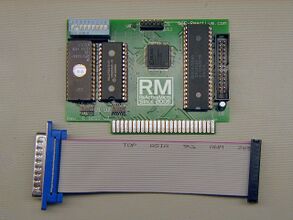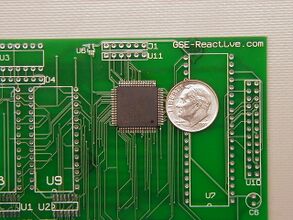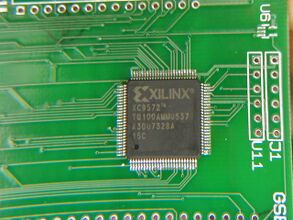Apple II SCSI Card: Difference between revisions
No edit summary |
No edit summary |
||
| (12 intermediate revisions by 3 users not shown) | |||
| Line 2: | Line 2: | ||
The Apple II SCSI Card project was the first experience Henry of [[ReActiveMicro]] had with CPLDs and VHDL coding back in mid 2006. The project however was never completed. This was also the last project under the "GSE-Reactive" brand. | The Apple II SCSI Card project was the first experience Henry of [[ReActiveMicro]] had with CPLDs and VHDL coding back in mid 2006. The project however was never completed. This was also the last project under the "GSE-Reactive" brand. | ||
<strong>Project Status:</strong> | <strong>Project Status:</strong> Developmental stages. | ||
== History == <!--T:2--> | == History == <!--T:2--> | ||
The idea behind | The idea behind this project was to learn more about CPLDs and how they worked. The Apple II SCSI Card had two PALs on it. Henry was able to successfully extract the coding from them as they were unsecured. This made the project possible as protected PALs would have posed a possible barrier. | ||
The Apple II SCSI Card project also marks the first time Henry outsourced work. He had a programmer layout the PCB and code for the CPLD. The programmer however didn't understand some basic issues, such as why the board used line drivers such as | The Apple II SCSI Card project also marks the first time Henry outsourced work. He had a programmer layout the PCB and code for the CPLD. The programmer however didn't understand some basic issues, such as why the board used line drivers such as a 74LS245. He also didn't know the Apple II or 65C02. Henry didn't know VHDL. Henry later discovered that when things didn't work, dealing with these issues was going to be a problem. Henry also lacked basic tools, such as a Logic Analyzer, which would have helped in diagnosing issues. | ||
After many attempts to debug the coding and issues, Henry gave up. He learned a lot from the project, which was the goal. It also was the reason he expanded the | After many attempts to debug the coding and issues, Henry gave up. He learned a lot from the project, which was the goal. It also was the reason he expanded the ReActiveMicro shop with all the tools they use today. | ||
At some point Henry would like to return to the project just to complete it. There is little demand of course for old, slow, SCSI Controllers. | At some point Henry would like to return to the project just to complete it. There is little demand of course for old, slow, SCSI Controllers. | ||
== Pictures == <!--T:2--> | == Pictures == <!--T:2--> | ||
<gallery class="center" widths=300px heights=220> | |||
<gallery class="center" widths= | File:Apple_II_SCSI1.jpg|Apple II SCSI and Cable.|link=https://wiki.reactivemicro.com/images/2/2b/Apple_II_SCSI1.jpg | ||
File:Apple_II_SCSI1.jpg|Apple II SCSI and Cable. | File:Apple_II_SCSI2.jpg|Apple II SCSI with dime for scale.|link=https://wiki.reactivemicro.com/images/0/01/Apple_II_SCSI2.jpg | ||
File:Apple_II_SCSI2.jpg|Apple II SCSI with dime for scale. | File:Apple_II_SCSI3.jpg|Apple II SCSI with CPLD.|link=https://wiki.reactivemicro.com/images/4/4d/Apple_II_SCSI3.jpg | ||
File:Apple_II_SCSI3.jpg|Apple II SCSI with CPLD. | |||
</gallery> | </gallery> | ||
| Line 27: | Line 26: | ||
<div class="new_window"> | <div class="new_window"> | ||
<gallery class="center" widths=150px heights=80 caption="More Pics, Docs, Software, and Info> | <gallery class="center" widths=150px heights=80 caption="More Pics, Docs, Software, and Info> | ||
File: | File:Wiki_RM_Downloads.png|Apple II SCSI Card Folder|link=http://www.downloads.reactivemicro.com/Apple%20II%20Items/Hardware/Apple_II_SCSI/ | ||
</gallery> | </gallery> | ||
</div> | </div> | ||
[[Category:Hardware]] | |||
[[Category:Apple]] | |||
[[Category:ReActiveMicro Projects]] | |||
Latest revision as of 12:10, 27 September 2023
The Apple II SCSI Card project was the first experience Henry of ReActiveMicro had with CPLDs and VHDL coding back in mid 2006. The project however was never completed. This was also the last project under the "GSE-Reactive" brand.
Project Status: Developmental stages.
History
The idea behind this project was to learn more about CPLDs and how they worked. The Apple II SCSI Card had two PALs on it. Henry was able to successfully extract the coding from them as they were unsecured. This made the project possible as protected PALs would have posed a possible barrier.
The Apple II SCSI Card project also marks the first time Henry outsourced work. He had a programmer layout the PCB and code for the CPLD. The programmer however didn't understand some basic issues, such as why the board used line drivers such as a 74LS245. He also didn't know the Apple II or 65C02. Henry didn't know VHDL. Henry later discovered that when things didn't work, dealing with these issues was going to be a problem. Henry also lacked basic tools, such as a Logic Analyzer, which would have helped in diagnosing issues.
After many attempts to debug the coding and issues, Henry gave up. He learned a lot from the project, which was the goal. It also was the reason he expanded the ReActiveMicro shop with all the tools they use today.
At some point Henry would like to return to the project just to complete it. There is little demand of course for old, slow, SCSI Controllers.
Pictures
-
Apple II SCSI and Cable.
-
Apple II SCSI with dime for scale.
-
Apple II SCSI with CPLD.



